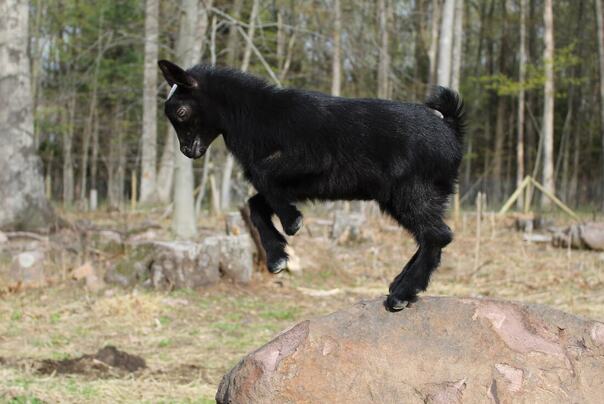Frequently Asked Questions!
When it comes to goats, we feel there is no such thing as a dumb question. How can you know the educated answer if you never ask, right? So we have compiled a list of some of the most common questions we have been asked over the years in hopes of helping new goat owners start off on their journey armed with the knowledge of good goat husbandry. One thing you will find as you research on your own is that just like parenting a human child, there are LOTS of ways to raise goats (and do it correctly). It is not a one size fits all world out there. What works one may not work for another. As you get more comfortable, you will learn what works for YOU and you will also pick up new tricks along the way from other seasones owners. With that, here is our list! Enjoy!
What is a "wether"?
A wether is basically a male goat who has been "neutered", or in the goat world, banded. This is usually done when they are young between the ages of 8-16 weeks. Wethering a male goat prevents them from acting like bucks (see the 'which goat makes the best pet' question below for details on that), and provides you with a loving and good natured pet option. In our herd, only the best boys will get to stay bucks so that we can continue to better the breed and pass on superior genetics. Therefore, we will most likely always have wethers available during kidding season.
Can you have just one goat?
In theory, yes, you can BUY one goat, however the correct question really is "SHOULD you own one goat"?, and the answer to that question is a resounding NO. The reason for this is that goats are herd animals. They thrive with the company of other goats and ideally should never be kept by themselves, even if you have other pasture animals of different species. We actually do not sell to single goat homes or individuals that want "just one little house goat" because it is not at all in the best interest of the goat to be raised alone. So the short answer is, if you are just starting out, plan on purchasing two goats (or more if you are able) initially. Once you have a small herd established you can add one goat here and there to your current group until you get to the size you like.
Does my goat need vaccines like any other pet would?
Yes! Goats do require one main core vaccine, which is known as the CD&T vaccine. This vaccine protects against tetanus and a bacterium called Clostridium perfringens types C and D, which causes a condition known as enterotoxemia or "overeating disease". This vaccine is given in a series of 2 when the kids are young (usually around 5-6 weeks with a booster given 3-4 weeks later), then annually after that. This vaccine can be purchased and administered by you, or if you are not comfortable with that and the thought of needles makes you cringy, your veterinarian can booster their vaccine once a year for you. What vaccine you need beyond CD&T depends on your region and what diseases are a primary concern there. Your veterinarian can help you establish a vaccine protocol for your herd based on their risk factors.
What should I feed my goat?
This is another question that if you search on Google, you will probably find a thousand correct answers to. Although there are some areas that almost all seasoned people agree upon, and one of those is grain. Grain (commonly marketed as sweet feed or goat pellets), can be fed to your goats, but in MODERATION. Grain should NEVER be a goat's primary diet, or you are just asking for trouble. With wethers, grain is believed to contribute to urinary stones which can lead to blockages. We recommend if you give grain, do so as a treat, unless you are raising dairy goats (in which case feel free to contact us to discuss our current dairy feeding protocol), and make sure the grain contains amonium chloride, which helps prevent urinary crystal formation. Goats do best with a high quality hay diet (first cut or second cut is fine). Mixed grass, orchard grass and timothy are all great options for all genders of goats. We do use alfalfa also, but only for our young kids and does during pregnancy and in milk. With wethers and male goats, you want to try to adhere to a 2:1 calcium to phosphorous ratio. This provides better urinary health and can help prevent urinary crystals from forming.
Goats can be fed hay pellets (watch for choking as some goats inhale these!), but these should be supplemental to your actual hay diet since the roughage of hay actually stimulates the GI tract and provides optimal GI health.
Other dietary requirements are a good goat mineral (make sure this is specific to goats since goats have a higher copper need than sheep or other livestock), fresh water, and baking soda can be provided if the goat appears bloated or has eaten a large amount of food.
Diet is probably one of the trickiest parts of goat ownership, and our protocol literally changes all the time. Feel free to message us with any further questions!
Goats can be fed hay pellets (watch for choking as some goats inhale these!), but these should be supplemental to your actual hay diet since the roughage of hay actually stimulates the GI tract and provides optimal GI health.
Other dietary requirements are a good goat mineral (make sure this is specific to goats since goats have a higher copper need than sheep or other livestock), fresh water, and baking soda can be provided if the goat appears bloated or has eaten a large amount of food.
Diet is probably one of the trickiest parts of goat ownership, and our protocol literally changes all the time. Feel free to message us with any further questions!
Can I teach my goat to walk on a leash?
Absolutely! Our goats are all leash trained, which makes moving them to different areas SO much easier. While we don't stroll down the street, taking our herd for a walk, we do routinely practice leash training with them for show purposes. Just like a puppy learning to walk on a leash for the first time, goat kids will act like the world is ending the minute tension is put on their collar, and their cries of distaste for this new activity will probably bring curious glances from your neighbors. But don't despair- gentle consistent training will have you frolicking around your yard with your little hooved friend in no time! You can message us for tips and tricks for getting started.
Which goats make the best pets: boys or girls?
This is probably one of the most common questions we are asked, and the answer will probably vary depending on who you ask, so this answer is just our personal opinion (having owned bucks, does and wethers). For pet only homes, we feel wethers are the best choice, with does (girls) being a second runner up. Wethers are playful, funny, loving and keep a very kid like personality their whole lives. I like to call them the Peter Pan goats, because they literally never grow up emotionally. Does can also be very friendly, but we find our girls are a tad more aloof than their fun loving wether pasturemates. So really it depends on what you are looking for in your pet. We do NOT recommend buying a buck and expecting to make a pet out of him. Bucks are for breeding only. That cute little buck kid you bring home that snuggles up in your lap, within a year will turn into a large, blubbering, urinating, mounting, male that will have a stench that will make Sasquatch run the other direction. They also have some really unsavory habits that once you see, you cannot unsee (I will spare you the details). While I am probably one of the few people that enjoys interacting with my boys, I do not see them as "pet worthy" by any means.
Are kids raised by their moms less friendly than bottle raised kids?
Ah, the age old question! The true answer in my opinion is this- if you find a breeder who puts a lot of time into their goats and dam raised kids when they are born until the time they come to you, you will not notice a huge difference between dam raised vs. bottle babies. We have dam raised many of our little guys, and all of our foundation goats were dam raised prior to them joining our farm. We frequently are asked by visitors if our goats were all bottle raised as kids. We spend A LOT of time with our goats and do our best to provide others with a well socialized and well mannered caprine! Although we do bottle raise some kids, they are never "house goats" for any prolonged amount of time (most are started in the barn as soon as they are stable and eating well). We feel that goats need other goats, and that goat kids thrive on learning the social structure of a herd. Raising kids in the barn where they can be around other goats helps them to adjust to life in a herd versus looking at humans as their "herd".

